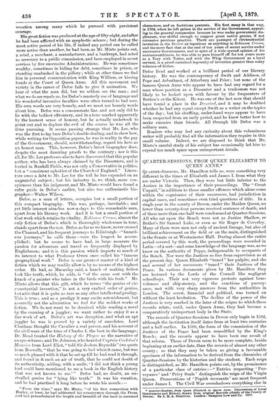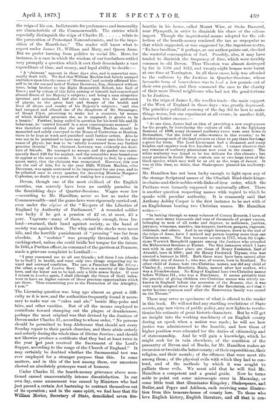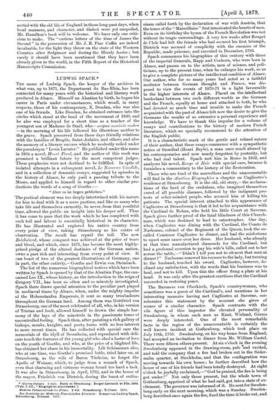QUARTER-SESSIONS, FROM QUEEN ELIZABETH TO QUEEN ANNE.*
QUARTER-SESSIONS, Mr. Hamilton tells us, were something very different in the times of Elizabeth and James I. from what they are under Victoria. Then, they were but little inferior to the Assizes in the importance of their proceedings. The " Great Unpaid," in addition to those smaller offences which alone come within the cognisance of their successors, had jurisdiction in capital cases, and sometimes even tried questions of title. In a single year in the county of Devon, under the Maiden Queen, no fewer than seventy-four persons received sentence of death, and of these more than one-half were condemned at Quarter-Sessions. All who sat upon the Bench were not as Justice Shallow, or Butler's Sir Samuel Luke, or even as Sir Roger de Coverley. Many of them were men not only of ancient lineage, but also of brilliant achievement on the field or on the main, distinguished in the Senate or at Westminster Hall. During almost the entire period covered by this work, the proceedings were recorded in Latin—of a sort—and some knowledge of the language was, as we know on the authority of Pepys, indispensable to occupants of the Bench. Nor were the Justices so free from supervision as at the present day. Queen Elizabeth "tuned" her pulpits, and she and several of her successors " tuned " their Justices of the Peace. In various documents given by Mr. Hamilton they are lectured by the Lords of the Council like negligent schoolboys. Their not very vigorous protests against bene- volences and ship-money, and the exactions of purvey- ance, met with very sharp answers from the authorities in London. The screw, financial and political, was turned on without the least hesitation. The decline of the power of the Justices is very marked in the later of the reigns to which these records relate, until, under Queen Anne, they had become a comparatively unimportant body in the State.
The records of Quarter-Sessions in Devon only begin in 1592, although the institution itself dates from at least two centuries and a half earlier. In 1590, the form of the commission of the Justices of the Peace had been remodelled by the King's Bench; and the records appear to have been one result of that reform. Those of Devon seem to be more complete, beside beginning at an earlier date, than the records of almost any other county ; so that they may be taken as giving a favourable specimen of the information to be derived from the chronicles of Quarter-Sessions by the historian and the student. Each reign is distinguished, as Mr. Hamilton points out, by the prominence of a particular class of entries :—" Entries respecting ' Pur- veyance' and ' Privy Seals' distinguish the reign of the Virgin Queen. Prosecutions of `Popish recusants' are most frequent under James I. The Civil War overshadows everything else in
• Quarter-Sessions, from Queen Elizabeth to Queen Anne. Illustrations of Local Government and History, drawn from original Records (chiefly of the County of Devon). By A. H. A. Hamilton. London : Sampson Low and Co. 1878.
the reign of his son. Indictments for profaneness and immorality are characteristic of the Commonwealth. The entries which especially distinguish the reign of Charles II relate to the persecution of Protestant Nonconformists, and to the impo- sition of the Hearth-tax." The reader will know what to expect under James II., William and Mary, and Queen Anne. But we prefer turning from politics to social life. Here, for instance, is a case in which the wisdom of our forefathers settled very promptly a question which it cost their descendants a vast expenditure of time, and money, and legal ability to decide :—
" A `claimant' appears in those days also, and is somewhat sum- marily dealt with. We find that William Machim had falsely usurped and taken upon him the name of Devereux,' and untruly affirmed him- self to be the son and heir of Walter Devereux, Esq., deceased without issue, being brother to the Right Honourable Robert, late Earl of Essex ; and by colour of this false naming of himself, had cozened and abused divers of his Majesty's subjects ; and being a man altogether ignorant and unlearned, had also taken upon him the profession of physic, to the great hurt and danger of the health and lives of divers and sundry of his Majesty's subjects ; and also had tempted and allured one of the daughters of Mr. Steaninges, of Broad Clyst, promising to make her a countess, by means of which doubtful promises she, as is supposed, is grown to be a lunatic.' Further, being called in question for his lewd life and ill- behaviour, he carried himself in a most contemptuous manner.' It was therefore ordered that the said William Machim should be manacled and safely conveyed to the House of Correction at Honiton, there to be kept at work and punished until further orders. Also be was not to be permitted to have any people resort unto him for any cause of physic, but was to be utterly restrained from any further practice therein.' The claimant, however, was evidently not desti- tute of friends. He managed to escape, and the gaoler was conse- quently fined £20 for his neglect, and the constables were bound over to appear at the next sessions. It is satisfactory to find, by a subse- quent entry, that the claimant was recaptured. However, this was not the end of him, for in the year 1628, William Machim, alias Devereux, was again sentenced to be imprisoned for one year, and to be pilloried once in every quarter, for deceiving Mistress Margaret Copleston, no doubt by a promise of making her a countess."
Devon, though one of the most civilised of the English counties, can scarcely have been an earthly paradise in the flourishing days of Quarter-Sessions. Wages were low —according to Mr. Hamilton, never so low as under the Commonwealth—and the game-laws were rigorously carried out, even under the regime of the " Keepers of the Liberties of England by Authority of Parliament." A wounded soldier was lucky if he got a pension of £2 or, at most, £3 a year. Vagrants—many of them, curiously enough, from Ire- land—swarmed, their hand against society, as the hand of society was against them. The whip and the stocks were never idle, and the horrible punishment of "pressing " was far from obsolete. A " scolster " was promptly threatened with the cucking-stool, unless she could bridlelier tongue for the future. In 1645, a Puritan officer, in command of the garrison at Peamore, made a grievous complaint to Lenthall :- " I pray commend me to all our friends ; tell them I am (thanks be to God !) in health, and want only two things respecting my in- ward and outward condition. The one, a Preacher like Mr. Barry ; the other, a cup of London Beer. There is a scarcity of the former here, and the latter not to be had, only a little sowre Syder. If ever I return to London again, I shall (through the Grace of God) indea- your to have an higher esteem of those precious opportunities which are there. Thus committing you to the Protection of the Almighty, I rest."
The Licensing question was long ago almost as great a diffi- culty as it is now, and the authorities frequently found it neces- sary to make war on " cakes and ale," beside May-poles and fairs, and other vanities. But of all the means employed to contribute toward stamping out the plague of drunkenness, perhaps the most original was that devised by the Justices of Devonunder Charles II., according to whose order, " No persons should be permitted to keep Alehouses that should not every Sunday repair to their parish churches, and there abide orderly and soberly during the whole time of Divine Service ; and should not likewise produce a certificate that they had at least twice in the year list past received the Sacrament of the Lord's Supper, according to the usage of the Church of England." It may certainly be doubted whether the Sacramental test was ever employed for a stranger purpose than this. In some matters, and in this of the test among them, our ancestors showed an absolutely grotesque want of humour.
Under Charles II. the hearth-money grievance above men- tioned caused unaccountably intense dissatisfaction. In our own day, some amusement was caused by Ministers who had just passed a certain Act hastening to contract themselves out of its operation ; and in the same spirit, we find here that Sir William Morice, Secretary of State, demolished seven fire-
hearths in his house, called Mount Wise, at Stoke Damerel, near Plymputh, in order to diminish his share of the odious impost. Though the inquisitorial means adopted for the col- lection of the hearth-money rendered the tax as unpopular as that which suggested, or was suggested by, the ingenious motto, " Ex Luce lucellum," it perhaps, as our author points out, checked the wasteful consumption of fuel. Possibly, also, it may have tended to diminish the frequency of fires, which were terribly common in old Devon. Thus Tiverton was almost destroyed
by fire in 1596 and 1612, and twenty-eight houses were burnt at one time at Torrington. In all these cases, help was afforded to the sufferers by the Justices in Quarter-Sessions, whose favourite form of benevolence was to lead a few pounds out of
their own pockets, and then commend the case to the charity of their more liberal neighbours who had not the good-fortune to be Justices.
Iu the reign of James I., the woollen trade—the main support of the West of England in those days—was greatly depressed- The primitive political economy of the day did its best to make things worse, but one experiment at all events, in another field,. deserved better success :—
" At one time, James had an idea of providing a new employment for the people, by introducing the culture of silk. At the Epiphany Sessions of 1608, many thousand mulberry-trees were sent down to. Devonshire, 'for the relief of silke-wormes in this countie,' to be divided among such of the land-owners as chose to pay three farthiags a-piece for them. The Lord-Lieutenant bad a thousand, and many knights and esquires took five hundred each. 1 cannot discover that any remains of mulberry plantations now exist in the county. The white mulberry was found to be too delicate for this climate ; but many gardens in South Devon contain one or two large trees of the black species, which may well be as old as the reign of James. It was at this time, no doubt, that Shakespeare planted his mulberry- tree."
Mr. Hamilton has not been lucky enough to light upon any of the strange Scriptural names of the Obadiah Bind-their-kings- in-chains-and-their-nobles-with-links-of-iron order, which the Puritans were formerly supposed to universally affect. There is another question respecting names with regard to which he speaks with peculiar authority. It is commonly said that. Anthony Ashley Cooper is the first instance to be met with of an Englishman bearing two Christian names. Mr. Hamilton writes :- " In looking through so many volumes of County Records, I have, of course, seen many thousands and tens of thousands of proper names, belonging to men of all ranks and degrees, to noblemen, justices,. jurymen, witnesses, sureties, inn-keepers, hawkers, paupers, vagrants,. criminals, and others. And in no single instance, down to the end of the reign of Anne, have I noticed any person bearing more than one Christian name. The first instance occurs in..1717, when Sir Cople- stone Warwick Bampfield appears among the Justices who attended the Midsummer Sessions at Exeter. The first instances which I have• met with in any other place are those of Henry Frederick, Earl of Arundel, born in 1608 ; and Sir Henry Frederick Thynne, who was created a baronet in 1641. Both these must have been named after the eldest son of James I., who was, of course, born in Scotland. No' other child of James bore two Christian names, nor did any child of Charles II., except Henrietta Maria, named after her mother, who• was a Frenchwoman. No King of England bore two Christian names before William III., who was a Dutchman. It seems probable that the practice of giving children two Christian names was utterly un- known in England before the accession of the Stuarts, that it was. very rarely adopted down to the time of the Revolution, and that it never became common until after the Hanoverian family was seated on the Throne."
These may serve as specimens of what is offered to the reader
in this book. He will not find any startling revelations of State- secrets, any new views of public policy, any new lights to revolu-
tionise his estimate of great historic characters. But he will get an insight into the working machinery of an English county during an epoch when a nation was made ; he will see how justice was administered to the humble, and how those of
higher position were educated for the duties of citizenship and of statesmanship. And he will gain a knowledge, which he might seek for in vain elsewhere, of the condition of the- peasantry of Devon and of Bucks, for Mr. Hamilton makes an excursion or two into the latter county; of their superstitions, their religion, and their morals ; of the offences that were most rife among them ; of the physical evils with which they had to con- tend, and of the methods by which it was sought to palliate those evils, We must add that he will find Mr.. Hamilton a competent and a genial guide. Now he turns aside to point out some microscopic error in Macaulay, or• some little trait that illuminates Kingsley ; Shakespeare, and_ Butler, and Pepys and Addison, each receiving some illustra- tion from this treasure-house of county lore. To those who love English history, English literature, and all that is con-
sleeted with the old life of England in those long-past days, when local manners, and character, and dialect were yet unspoiled, Mr. Hamilton's book will be welcome. We have only one criti- cism to make. The " curious letters of the time of James the Second " in the possession of Mr. J. R. Pine Coffin are indeed invaluable, for the light they throw on the state of the Western Counties after Sedgmoor and during the Bloody Assize ; but surely it should have been mentioned that they have been already given to the world, in the Fifth Report of the Historical Manuscripts Commission.




































 Previous page
Previous page